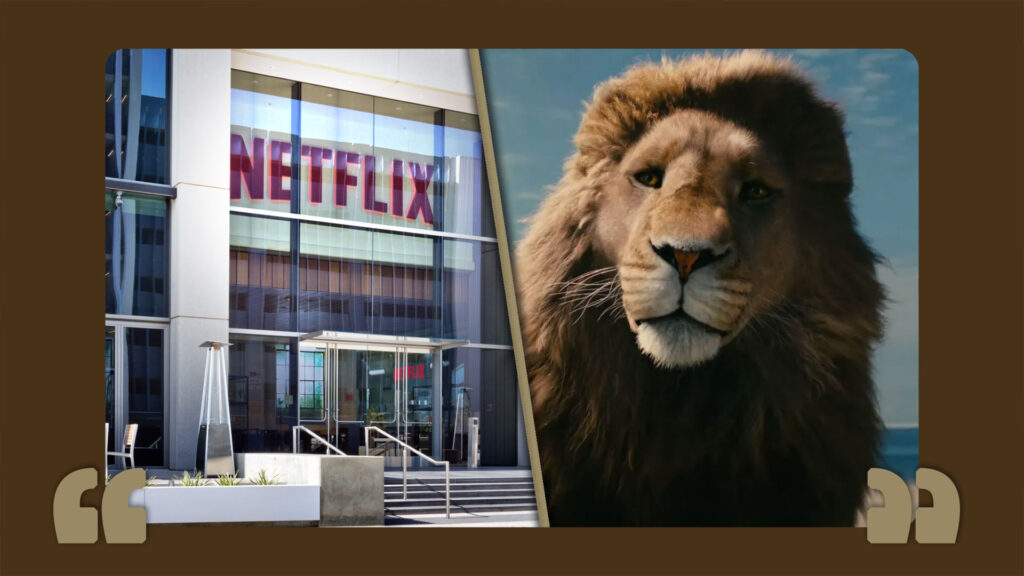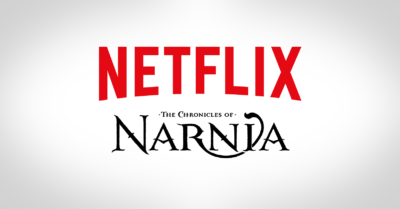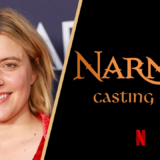Why Netflix is Staying Silent on Greta Gerwig’s Narnia | Analysis

The views and opinions expressed in this article are those of the author and do not necessarily reflect the position of NarniaWeb.
Nearly a year before its expected IMAX debut, Netflix has revealed almost nothing publicly about Greta Gerwig’s Narnia movies: no official title, no confirmed cast list, no concept art or logo — even as the production filmed in visible locations across England this summer. For a project reportedly among Netflix’s most expensive, with a budget that industry reports suggested could exceed $200 million, that silence has naturally raised questions among fans.
For longtime Narnia fans who’ve watched every attempt to revive the series since The Voyage of the Dawn Treader’s box-office disappointment in 2010, Netflix’s quiet approach can feel a bit unsettling. But what’s really behind it?
The Sound of Silence
That question has only grown louder after a particular casting rumour. In April, two outlets reported that Meryl Streep was in talks to voice Aslan, a report to which Netflix declined to comment. Whether the report is true or not (see NarniaWeb’s investigation), the story sparked intense backlash online and the studio’s continued silence since has, to some fans, felt less like strategy and more like damage control. Needless to say, it has cast a long shadow over subsequent coverage.
Part of that anxiety stems from details Netflix could easily confirm and from a worry among some fans that the silence is concealing more substantial creative shifts rather than mere marketing choices. If the widely circulated set photos identifying David McKenna and Beatrice Campbell as Digory and Polly are accurate, why not acknowledge them — or highlight the confirmed presence of top-tier behind-the-scenes talent such as production designer James Chinlund, set decorator Lee Sandales, costume designer Jacqueline Durran, and cinematographer Seamus McGarvey? Announcing lead actors and design talent would signal legitimacy after years of false starts, and they’d be earning far more media coverage if they issued press releases rather than relying on fan sites to first report these details.
Of course, early confirmation isn’t without risk: it can lock Netflix into premature messaging, disrupt negotiations, spoil later marketing beats, or extend controversy cycles before the company is ready. Netflix’s silence could, then, reflect a certain stubbornness — a confidence in its own methods, even when the cat’s already out of the bag. Netflix has repeatedly shown it will follow its own instincts about timing and control, even when that approach frustrates traditional fan communities.
Netflix’s Playbook
Over the last few years, the company has proven willing to compress promotional windows for its releases. A good comparison is Rian Johnson’s Glass Onion: A Knives Out Mystery. Despite being one of Netflix’s most prestigious acquisitions (a $450 million deal for two sequels to a non-IP film), the streamer kept marketing under wraps until just a few months before release. The first teaser arrived in September 2022, with the film premiering at TIFF days later and reaching theatres in late November. No long runway, no years of speculation; just a sharp, timed campaign leading directly into its streaming debut.
Knives Out illustrates both sides of the coin. A tightly orchestrated strategy and a stubborn insistence that Netflix’s model can replace the old long-lead playbook. That duality is exactly what makes the company’s silence on Narnia ambiguous: it may be smart planning, unapologetic confidence, or both.
This kind of rollout may feel counterintuitive for fans accustomed to the Disney model, where major franchises typically start marketing more than a year out to build anticipation. But Netflix’s playbook seems to value timing over teasing.
That approach also aligns naturally with Gerwig’s own filmmaking tendencies. She and husband/collaborator Noah Baumbach often develop films in a low-noise environment, letting a few carefully timed reveals carry the full weight of publicity. Baumbach’s upcoming Netflix film Jay Kelly, for instance, remained untitled and with only the briefest of synopses throughout most of its production. Barbie offered relatively little early detail before its marketing exploded — an effect Netflix will surely want to replicate, at scale, within its own ecosystem.
In that sense, the quiet might be less about hiding changes from fans and more about creative control: Gerwig and Netflix both prefer to speak when they can do so on their own terms.
Two Opposites: Netflix vs IMAX
Netflix’s approach to marketing has always been shaped by its business model: there’s little value in telling audiences about something they can’t watch immediately. As The Drum has noted, Netflix prefers audiences to discover a film by hearing about it and then instantly find it. The company’s strategy thrives on the shortest possible distance between awareness and availability.
IMAX, on the other hand, thrives on “eventizing” films as experiences. The large-format screen, the precision of 70mm projection (where available), and the immersive scale are all part of what you’re buying and how they justify the higher ticket price. That’s also why IMAX put select tickets for Christopher Nolan’s The Odyssey on sale a year in advance. They want audiences to treat IMAX like a once-in-a-decade concert rather than another casual night at the movies.
That’s where Narnia becomes a fascinating test case. Netflix’s first-ever IMAX partnership demands the kind of long-lead awareness campaign that runs counter to its usual “drop it when it’s ready” rhythm. Balancing those two opposing approaches will be a major test of how adaptable Netflix’s marketing strategy really is.
There’s already evidence Netflix recognizes the stakes. We’ve heard reports of the company courting a Hollywood marketing chief and consulting with faith-based media specialists, both of which suggest ambitions well beyond a typical Netflix rollout. Even the IMAX arrangement with Gerwig guarantees Narnia the kind of visibility and resources typically reserved for major studio blockbusters: premieres, press junkets, trailers, and a global rollout. It may not feel like it now, but Netflix seems to be building toward a much larger moment than it’s letting on.
Still, it’s worth remembering that Netflix’s ultimate focus isn’t the IMAX release but the streaming debut that follows. IMAX CEO Richard Gelfond recently explained that, for streaming platforms, the theatrical release is essentially “a trailer for the streaming run.” Netflix’s endgame has never been about box-office numbers, but viewership and engagement once the film lands on its own platform.
Silence Has Its Costs
For Netflix, that control has clear advantages. Holding back early marketing beats reduces the number of ways a campaign can go off-message, minimizes rumour cycles, and gives marketing teams time to craft a unified reveal — title, tone, and scale unveiled all at once when buzz can most effectively translate into streams. And it’s hard to argue with the results: with more than 300 million subscribers worldwide, Netflix can rely on its own algorithms and interface to put a film directly in front of audiences. In many ways, the platform is their marketing machine.
But here’s the oddity of Netflix’s silence. In trying to control the narrative, it might end up losing it. When a studio doesn’t fill that space with something concrete, fans and commentators inevitably will and then even the smallest hint of change can take on a life of its own. Expanding Polly’s home life or giving Jadis a wand might be minor adaptational choices, but they can suddenly feel seismic simply because there’s nothing else concrete to go on. The longer Netflix stays quiet, the more the conversation drifts away from the film itself and toward frustration, fatigue, or worse — apathy.
For a film expected to launch a universe, that approach carries its own risks. The same control that keeps the campaign tidy can also make it feel insular, as if Netflix’s desire to own every stage of the conversation outweighs its willingness to engage with fans who’ve been waiting for years.
Genre films and adaptations, after all, are built on participation. When Disney and Walden Media developed their Narnia films, they gradually built anticipation by sharing glimpses of the world, including concept art, production updates, and even the occasional on-set diary. None of it revealed plot details, but it offered fans a sense of direction and a reason to believe. That approach made the long wait feel like part of the adventure.
Netflix’s quiet approach may be deliberate, but it’s left many who’ve invested in this series feeling alienated. Even if their worst fears never materialize, a sense of uncertainty still hovers over the production. It’s true that, in the end, what matters most is the finished film. But a brief interview with Gerwig, a behind-the-scenes photo, or even a piece of concept art (perhaps something as simple as a maned lion) could help ease that worry and reassure fans that the story they’ve been waiting for is still on track, and still faithful to the heart of C.S. Lewis’s world.
Either way, the silence has become its own story. As the one-year countdown approaches, fans can only wait and wonder when Netflix will finally let Narnia speak.
If it were up to you, would Narnia’s marketing stay silent for now like Netflix’s approach, or would you reveal more to build excitement? Let us know in the comments below.






Thanks for writing this opinion piece. I’m one of the fans who is being driven crazy by the silence.
This really is typical Greta tho
https://youtu.be/H8H_s8sb-q4?si=cnes6kJBK_XC3gPy&t=272
Definitivamente si fuera del equipo de marketing lanzaría fotografías oficiales o algun “En producción” algo que deje tranquilos a los fans
As to what strategy they should take, they should put the privacy of the kids first and set their eyes on making a thoughtful film that bring the die hard fans and ordinary film goers alone, if they wish they could release a set photo
But there are already set photos, of the mained lion, they may release a photo around thanksgiving or after production. Tbf, The Killer, the David fincher film received the same treatment same as The Cliff Booth film which is filming. Just look at Frankenstein, it received no press until TUDUM. I’m sure with the large IMAX release something will pop up, maybe a cast list. Hopefully it doesn’t go to Venice, that would be a disaster, closing night of London Film Festival is best if going to a festival, but skipping the festival is far better.
As to the main fear of Meryl, she’s filming Devil wears Prada , and has a Joni Mitchell film and a film with sugourney weaver next yr plus Devil wears Prada 2 press in April , and obviously spending Christmas with the grandkids , I would highly doubt she would in her 50+ yr career start working on a FRANCHISE for the first time ever, even if it’s a voice performance that would require her commitment for the at least the next 15 years. She’s 76. So she’ll be assuming work till 91 !?!
Most people don’t know that a new Narnia production in the works or that these “questions” exist and are unanswered. A majority of the audience isn’t chronically online and following production leaks or Narnia fansites. Why open the can of worms and boost the speculation and opinion-making of viewers when they are months away from having an actual product to see and judge fairly?
I must admit I often cast an envious eye over at the world of Marvel, DC and Star Wars, where the long-lead fan engagement events are very much baked into the culture these days. Even right now, James Gunn is talking directly to fans about the storyboards for his new Superman sequel before a single frame has even been shot.
To some extent therefore, it might just be a case of calibrating expectations, however with so many unknowns at present, it’s difficult to know exactly what level we ought to calibrate those expectations at, however I think this article does a good job at highlighting slot of the complexities in that situation
I really don’t understand the issue with Netflix’s silence. There are all sorts of legitimate reasons why studios keep quiet about projects as part of an overarching PR strategy, especially when it comes to reviving beloved IP. I think about my favorite television show, Twin Peaks, one of the best series ever made. When David Lynch revived it in 2017, Paramount was notoriously tight-lipped about the project. No one knew what the plot would be or even what form it would take. There are so many other examples. I get that fans want to be placated but at the end of the day this is a movie we are talking about; it is not life and death. Gerwig has never made a bad film and she isn’t about to start now. They’re clearly adapting the Magician’s Nephew and given that filming is well underway, we can’t reasonably question whether this is a false start. It’s not. It’s happening. I think we should be grateful we’re getting an adaptation at all, esp of a book that has never been adapted for the screen, and that it’s being made by top tier talent. Oh, AND that Gerwig fought for a theatrical and IMAX release. It’s gonna be fine. It doesn’t come out until 2026, it’s not a mystery why there hasn’t been a ton of news about the film. They don’t need to do any marketing yet, we are still a year out from the film’s release. Again – this is not some rare thing. Studios are right-lipped about projects ALL the time. And re: the Aslan casting, I think you’ve just validated Netflix’s silence on the matter. People lost their minds over the Meryl rumor despite being unconfirmed and without that rumor having any other context. We don’t know if it’ll be her voice, or (if it is) how that will alter or not alter the character. Maybe Aslan will have multiple voices. Maybe Aslan will be gender neutral, which is fine by me. Maybe the voice is meant to simply sound neutral. Maybe Aslan will be male, but voiced by Meryl (she’s played men before). Or hell, maybe the character will be voiced by someone else entirely. I believe people need to take a chill pill and stop judging something based on rumor, and without having seen a single frame of the film. It’s a movie. It matters to fans, of course, and I’m one of them. I’ve loved Narnia all my life. But it is not so important that we need to be placated over rumors that may or may not be true. I’m sure we’ll learn more in due course. Again – the film won’t even be out for a year! There is very little about this period of silence that’s out of the ordinary.
Definitely, Netflix should share some art, interviews and cast/crew confirmation, and the official title.
This would connect with fans – and there are many. I see many Narnia fan Facebook groups suggested to me. There is Narniaweb and Narnia Fans. Into the Wardrobe on Youtube. There are also many Christian bloggers and youtubers who would follow along with announcements and teases. Not to mention the mainstream movie youtubers in general.
Netflix might want to rely on their digital platform to market the movie, but I believe their marketing goal should be, in part, to convert the non-subscribed Narnia fans to join their service. There are already a few fans angry towards Netflix for some controversial and/or non-family friendly films they have released in the past. Communicating in a nice way about Narnia could build trust with the fanbase and encourage more people to stream it.
The conversations around Narniaweb, especially my experience on Discord, have shown that many Narnia fans feel dejected and tired about the disappointments surrounding various production reveals. The 1955 setting (and implied modern setting for later stories), Jadis’ wand, Jadis’ costume and the Aslan casting rumour has caused a sour taste in some mouths, so to speak. It would be great to have a few “sparks of joy” to lighten the mood and keep us going.
@setherica Dumas, As the article states, there were two media outlets who reported Meryl Streep was in talks to portray Aslan, and one of them was Deadline which is a large, reputable outlet. It was never just an unconfirmed rumour. It is confirmed that she was “in talks” about the role, whatever that looked like.
This is a link to NWeb’s recent analysis, which came to a conclusion about how this will probably play out. It includes references to other production sources too.
https://www.narniaweb.com/2025/08/narniaweb-investigates-will-aslan-be-a-lioness/
I feel like Netflix releases a good deal of info once filming has finished on a project. So I am personally expecting (at the very least) a full set of casting announcements in December or early January when filming wraps. We’ll see.
The silence speaks volumes, and not good ones. They clearly don’t care about the fans and are not making this for the fans. They are making this to change Narnia into something that it isn’t. If they were making this as a proper adaptation they would most certainly be engaging the fanbase. But the fanbase would tear them to pieces if they knew all they were up to! So the silence remains.
Walden Media engaged the fans because they cared. I am so grateful for the love they put into all 3 films. I will cherish them forever. Like “The Lord of the Rings”, the Walden films were lighting in a bottle and can never be re-created. Everyone should be glad that they were made and that they were made when they were. They are works of art and should be cherished.
Modern Hollywood streaming service movies are never going to be good, so don’t hold your breath and waste your time wondering and wishing. A year from now is a long way away and it’ll be disappointing enough when it comes so you may as well find something better to do with your time then hoping that Netflix will notice the dwindling comments on a 20 year old fan site.
To the point: has ANY longstanding trad-based IP NOT been recently guillotined by today’s media leaders? Exactly. What Amazon did to Tolkien, Netflix will do to Aslan. Brace yourselves, Friends of Narnia, stop hoping for good things now! (and if Gret-Ger happily surprises, rejoice when you see!)
Very balanced article. As long as Aslan isn’t being portrayed as a female lion, then I can forgive the silence. 8-10 months is plenty of runway for marketing to kick in and get people excited!
If it were up to me, I would do some sort of tease/reveal on Nov 26th to kick off the 1-year countdown.
PS: not sure why people feel the need to tell others how to feel, I think it’s great that people share opposing opinions on Narnia.
It’s always frustrating for fans of existing stories when a filmmaker decides to put their own “spin” on it and ends up changing what made the story so good in the first place. Case in point–Walden Media let “green mist” take over The Voyage of the Dawn Treader as a villain, instead of letting the protagonists also be the antagonists. But ultimately, I feel that all is forgivable if Netflix is committed to adapting the entire series. However, that is what I find most concerning.
Not only has Netflix said nothing of their commitment to make all seven books into films or limited series, but they also haven’t confirmed whether Greta Gerwig will direct any other Narnia projects. So what we have here is yet another slow and directionless attempt at a Narnia cinematic universe, which seems likely to fizzle out before it’s finished. No unifying creative vision, no roadmap for how to avoid actors aging out of roles (*clears throat* Eustace), and no genuine enthusiasm for theatrical releases. That means this project may be a one-off: a Narnia reboot that will wither and die at Netflix’s discretion, based on online streaming numbers that they won’t disclose.
So forgive me for my pessimism regarding Netfrix’s new Narnia film franchise. I don’t mind the fact that we haven’t heard anything about this film, since it’s still in production and its release is over a year away. I don’t mind that Greta Gerwig is directing the film, or that some changes are being made. What bothers me is that there doesn’t seem to be a long-term plan for the series. When Greta finishes the film, will she sign off for good, or will she make that rumored second film? Will Netflix be willing to pay the premium to commission a second movie? Is the cost of this film an indication of Netflix’s bullish optimism for the franchise as a whole, or will its cost drain the coffers and put a stop to future installments?
I don’t need surreptitious set photos or a leaked script–all I ask is that Netflix doesn’t adopt a hesitant, stop-and-start, wait-and-see approach to Narnia. If people knew that Netflix intends to make the full series, they would be more interested in the first installment. If people knew that Netflix had plans for future films, they would be more likely to watch this movie.
I’ll gladly accept a lower-budget, cost-conscious approach if it means a complete visual realization of the books. However, it seems that Netflix is bankrolling a single, expensive, prestigious project with an acclaimed filmmaker just so they get something out of the licensing deal they inked over eight years ago.
Hey @Kent! Good thoughts!
I’ll mention here that Greta Gerwig does have a deal with Netflix to write and direct “at least” two Narnia movies. We’ve also heard a Netflix executive discuss how Gerwig, along with producers Amy Pascal and Mark Gordon, was working on how to “break the whole arc of [the series].” So it seems like there are some long-term plans… of course, done so in secret like everything else from this production 😉
I think starting with The Magician’s Nephew is the best decision for launching a new series which can be sustained. But I imagine that producers will wait and see the reception is like before talking too much about their roadmap for the series.
As fans, we can all due with being a bit more patient (myself included). Let the filmmakers do their thing, and we can praise what we’re seeing or tear it to pieces once we’ve seen the movie. It’s definitely disappointing that we haven’t got any official teases or releases, but we’re still getting a fairly steady trickle of leaks and reveals here on Narnia Web to keep the discussion alive.
By this time next year, I can guarantee we’ll be swamped with so much marketing that it’ll be hard to keep up. Let’s remember that!
I’m one of those fans who’ve been very concerned at the lack of communication from Netflix. Between the Aslan rumor and the timeline change, you’d think that they would at least be trying to “woo” existing fans to stay the course and not write off the whole project. But it was partially comforting to read that this silent approach might not be unique to Narnia and could be more of a result of their larger brand strategy.
I won’t say it’s a good strategy though LOL
Any controversy can be good for a film and silence can lead to more conversations as fans furiously look around for any information they can find.
They’re being silent because if they publicize it too much, and it sucks (which it will), the fallout will be more severe than if they treated it as some low-level fan project.
Can someone point me to any studies that show that promoting your movie 1+ year in advance benefits box office or critical reception? They’ll have to do some marketing eventually, but general audiences aren’t buying movie tickets 10 months in advance… it’s usually the night (or week) before going out. Plus, because this is a Netflix movie, they don’t even have to make arrangements to watch. They can simply turn it on after they see the trailer or whatever. If we still don’t have a cast, trailer, poster, or interviews from the creatives involved by next May/June, then I’ll be worried about what it means for the movie itself but it’s still just too early.
“We’ve heard reports of the company courting a Hollywood marketing chief and consulting with faith-based media specialists”
Now this I find super interesting. I wonder to what extent they’ll explicitly cater promotional material to the Christian audience. Prince Caspian almost completely ignored that market and Dawn Treader really tried to play into it, but they both ended up with similar box office returns. If they’re really speaking with Christian marketing agencies, then that should give worried fans a bit of hope that the movie won’t be outright disrespectful to their faith.
@Jake – Why go out of their way to premiere a movie in IMAX, acquire marketing teams, and sink 200 million dollars into it if they don’t want people to know about it? If your theory were true, we would be seeing Netflix just dropping it on their own platform with no fanfare. Also, in what world is a Greta Gerwig movie considered a “low-level fan project”? You don’t have to like her movies but she’s one of the buzziest names directing in Hollywood these days. All eyes will be on Narnia next year.
With all this hush-hush, it better be worth the wait. Your move Netflix.
I’m saying that if they treat it as a low level fan project, then when it fails, it won’t be as big a deal. They can shell out that money for IMAX and all that, but with all the big box office films that were supposed to be huge hits objectively failing, they’re wise to not publicize it too much, at least not at this point.
All I really know about Greta is that Barbie was one of the absolute worst films I have ever seen.
MS, I don’t feel Walden’s DT had the same amount of marketing as PC, and neither had as much as LWW. Disney went all out to market LWW: a church press kit, school press kit, McDonald’s action figures, video game, Disney mall store displays, a Risk game among other things. It also benefited from being the book most read by people for school, etc.
Netflix has a different manner. I wish they’d be more open. I don’t want to get my hopes up and then be sad if it doesn’t feel familiar.
Just saw the WILDWOOD LAIKA stop motion animated feature trailer and I can see WILDWOOD , drinking The Magicians Nephew’s milkshake.
The talking animals, incorporation of fantasy and flight sequences with a big animal plus the overall story over a child trying out save their family member
Some sequences from trailer could be straight out of the Narnia film.
My fear for the film is that it’s like the film Blitz (2024) meets a Wrinkle in Time, a lesser work from a beloved auteur that just fails to ignite the passion.
The thing in the film’s favor is just Greta’s unabashed passion for The Magicians Nephew, it’s all over Barbie. You could almost call Barbie a test run for The Magicians Nephew, narratively: a twisted, play on the hero’s journey , moving between worlds, creator and creation, conflict of the heart, the banter between a male and female traveler. Will Ferrel who is an almost Uncle Andrew, Ruth Handler as Aslan,…. The final minimalist place is basically a place between worlds, or the car chase scene and conflict caused in ‘real world’ is by people coming in from another world, even the change of clothes. So I’m curious how she refines some of those ideas and improves craftsmanship of her filmmaking. Making a good film is ALL the good marketing you need.
“Stubborn” is a good word to describe Netflix. I once asked Ted Sarandos if he would consider placing more movies and shows on DVD after a certain amount of time to allow access for those like me who refuse to pay for streaming, and he said no, even though it’s clearly another source of revenue. Their insistence that there’s is the best way I feel is hurting the industry by hurting theaters and focusing too much on streaming, so I think that’s an apt way to describe them.
I want to know WHO is playing Aslan I do NOT want Meryl Streep as Aslan I would say maybe Liam Neeson again or maybe someone else I want to know your thoughts
Thank you for writing this article. I’m going crazy with their silence.
My fear is it will be a massive flop and no more will be made – not really – that would be the best outcome.
I’ve waited 15 years for another Narnia movie so you can bet that I’ll manage for another few months! Excited for the big reveals!
@ Just Queen, not High Queen
Just from a purely sales perspective, DVD and Blu-ray sales are effectively dead. There’s no financial incentive for Netflix to release Narnia or any other title as a home release anymore.
Natasha, are they really? I still buy DVDs of the things I really like. It’s cheaper overall to do this and use the public library unless you have time to binge watch constantly.
Alex Anar, I had not noticed all those similarities between Greta’s Barbie movie. This is a good observation.
@EJH Agreed. You can’t gift streaming. I love buying DVDs and I use the public library all the time. My feeling is that if you don’t pay to see a movie in theaters, you shouldn’t have to pay to see it at all, since the library is free, but you can’t see things at the library if it’s not on physical media.
It’s not just DVDs that Netflix is stubborn about. It’s also movie theaters in general. And not releasing most of their films either way has been detrimental to the industry.
Just Queen, I know Netflix released a couple seasons of Stranger Things on discs because they were at my library. Apparently they went back and changed things in the early seasons when they made the later seasons so the DVDs are no longer “the official version” but that’s the only Netflix owned series I’ve found on discs.
We found the Netflix/DreamWorks collaborations of Trollhunters and Dragons Race to the Edge on DVD. I guess there is a chance Netflix’s Narnia could be on DVD, but I really doubt it because it’s not consistently part of their model.
For me, even buying DVDs new is a better deal than to buy streaming unless I’m binge watching things in Spanish to force studying, because I only really enjoy watching about 3-4 hours of tv a week and I like to rewatch things. Like, my family spent an entire summer solely watching the original Teen Titans DVDs plus a few movies. I don’t really understand how DVDs can be dying out.
@EJH I knew about Stranger Things and Wednesday and I certainly do appreciate that. But I am finding they’re slightly better about this for shows than movies and it isn’t consistent enough. I’ll give credit for HBO Max. Most of their shows and movies are eventually released on physical media. It allows a window of exclusivity before allowing for greater access.
Maybe they are being silent because they have cast Streep as Aslan and they know the true Narnia fans will come unglued. I know that one detail will determine whether I watch his movie or I don’t. I’m already going in with extremely low expectations and I’m very concerned about Gerwig being in charge.
Just Queen, I was researching and found out that the Disney Corporation is no longer releasing any Blu-rays and DVDs in Australia (possibly to sell more subscriptions). This is going to affect poorer families most, as they won’t be able to borrow DVDs from the library or friends.
For me, borrowing the first season of Stranger Things on dvd made me more interested in watching later seasons on Netflix. Except for limited cell phone data, I don’t have Internet. When I do buy Netflix I am not so adventurous at temporarily downloading things I might not like because it takes a while to download episodes off library wifi and if you don’t watch them by the deadline it still counts against the number of times they can be downloaded. The same with Cobra Kai, I watched a few episodes on Netflix, but then I checked it out from the library and it didn’t have the Spanish language track like Netflix did, so I watched some in English to catch nuances I hadn’t understood and then got Netflix again. I don’t know that it will make sense to everyone, but for me, Netflix stuff at the public library actually seems to be an advertisement for the newer seasons. Netflix should follow this scheme with Narnia and release DVDs of the Magician’s Nephew right before the premiere of the next Narnia movie, I think.
HBO Max is joined by Sony in excellence. Sony still releases DVD an Blu-ray packs together so you don’t have to waver on whether you want to buy it to watch on the living room tv or the laptop.